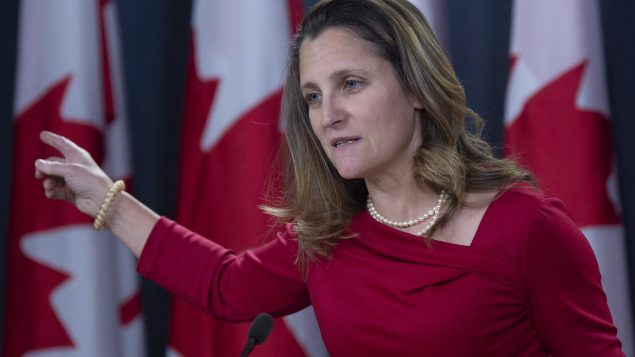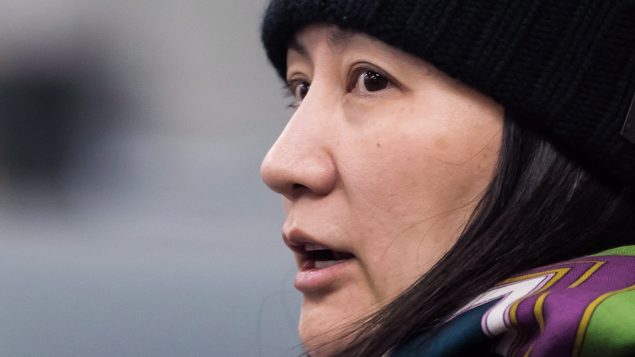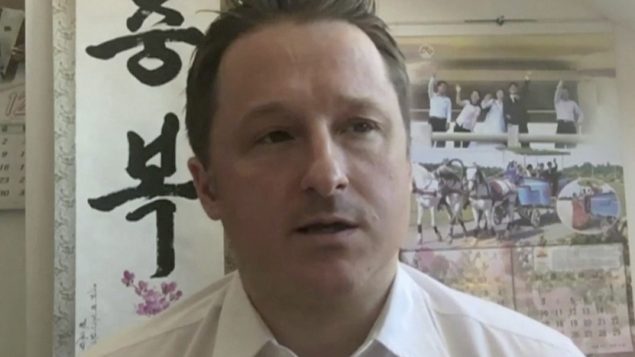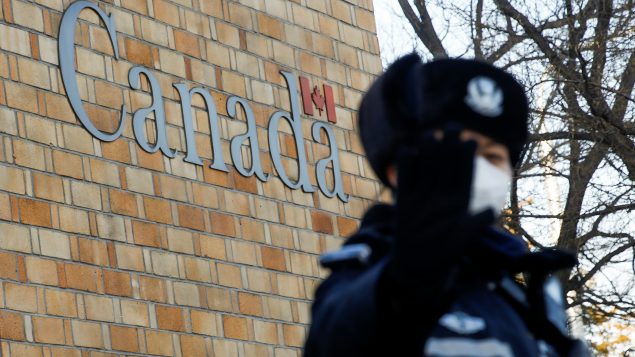Chinese authorities had to take “compulsory measures” against two Canadian citizens suspected of “endangering national security,” China’s Foreign Ministry said Thursday.
China-based social entrepreneur Michael Spavor and former Canadian diplomat Michael Kovrig were taken into custody on Monday, ministry spokesperson Lu Kang told journalists in Beijing.
Spavor, who ran a non-profit organization that organized cultural and sports exchanges with Pyongyang, was arrested by the State Security Bureau of Dandong City, Liaoning Province, near the border with North Korea, Lu said.
- Ottawa lost contact with another Canadian in China, says Freeland
- A second Canadian arrested in China as Canada-China spat heats up
Kovrig, who was on an unpaid leave of absence from Global Affairs Canada to work as an expert on North-East Asia for the International Crisis Group, was arrested by the Beijing Bureau of Chinese State Security, Lu said.
“These cases are still under investigation,” Lu said. “The Beijing State Security Bureau and the Liaoning State Security Department have respectively informed the Canadian Embassy in China of these cases.”
The “legitimate rights and interests” of the two detained Canadians are guaranteed by Chinese law, Lu said.
But Lu would not say whether they’ve been given access to lawyers and consular assistance.
Ottawa is ‘seized’ by these cases

Minister of Foreign Affairs Chrystia Freeland speaks with the media during a news conference in Ottawa, Wednesday December 12, 2018. (Adrian Wyld/THE CANADIAN PRESS)
Other than receiving faxed notifications of the arrests of these Canadians, the federal government has had no news from either Kovrig or Spavor, officials said Wednesday.
The Canadian government is “seized” by these cases and has raised them directly with Chinese authorities, Canadian officials said.
They are also providing consular assistance to the families of both detained Canadians, officials said.
News of their disappearance broke after a Vancouver court on Tuesday granted bail to Meng Wanzhou, chief financial officer of Chinese telecom giant Huawei. She is awaiting the outcome of extradition proceedings to the U.S. on fraud charges linked to possible violations of U.S. sanctions on Iran.

Huawei chief financial officer Meng Wanzhou, talks with a member of her private security detail after they went into the wrong building while arriving at a parole office, in Vancouver, on Wednesday December 12, 2018. (Darryl Dyck/THE CANADIAN PRESS)
“We ask the Canadian side to immediately correct its mistake and release Ms. Meng Wanzhou,” Lu said.
Freeland reiterated Wednesday that as “a rule-of-law country” Canada had no choice but to act on the U.S. request to arrest and extradite Meng, that her case in Canada’s eyes it’s a purely legal matter.
However, in an interview with Reuters on Tuesday, U.S. President Donald Trump torpedoed Canada’s insistence that the matter should not be politicized when he indicated that he was willing to intervene on Meng’s behalf if it would serve national security interests or help get a better trade deal with China.
“Whether the Meng Wanzhou case is a legal matter or political matter, the Canadian government knows it better than anyone else,” Lu said Thursday.
Who is Michael Kovrig?

Canadian officials say they are deeply concerned by the reported arrest of former Canadian diplomat and North East Asia expert Michael Kovrig in China. (International Crisis Group)
Kovrig, who speaks fluent Mandarin, was a great foreign service officer and was promoted to the position of first secretary in the political section of the Canadian embassy in Beijing, said former Canadian ambassador in China Guy Saint-Jacques.
As a former journalist, Kovrig is an excellent writer and has a knack for presenting complex issues in a simple yet nuanced way, Saint-Jacques said.
“Throughout his two years at the embassy, I enjoyed first quality reporting that he provided,” Saint-Jacques said.
“Michael traveled extensively in China to places like Xinjiang and met with Chinese dissidents, and therefore he had access to a lot of information, so not only did I benefit from reading his reports but also talking to him because with all his travels and contacts he had a good pulse of what was happening.”
Kovrig was fascinated by China and when at the end of his posting to Beijing, he wanted to stay in the country, Saint-Jacques said he suggested to Kovrig to take an unpaid leave from Global Affairs to pursue his research interests.
“But I really hoped that he will come back to the department because we can certainly make use of his skills and competencies,” Saint-Jacques said.
‘The nicest person’
Joanna Chiu, deputy bureau chief of Star Vancouver, part of the national Toronto Star network, said Kovrig was one of the first people she met in Beijing in late 2014 when she moved there to work as a foreign correspondent for European news agencies.
In the tight-knit community of Western journalists, NGO workers and diplomats, people quickly found new friends who shared the same passion for learning more about Chinese culture and language, Chiu said in a phone interview from Vancouver.
“Michael reached out to me pretty quickly after we met as a group to grab lunch because we wanted to trade notes about politics, things happening in China,” Chiu said. “He wanted to speak about his work and he wanted to understand all the time.”
ListenOnce he took unpaid leave from Global Affairs Canada, Kovrig was hired as a senior adviser on North East Asia by the International Crisis Group, a nongovernmental think-tank and moved to Hong Kong.
“The whole aim of that group is to use research and use knowledge to prevent deadly conflict,” Chiu said. “So a lot of his focus was dedicated to trying to get people around the world to understand China’s tensions with other countries, ways that they can be resolved.”
On the personal level Kovrig was “the nicest person,” she said.
“I’ve never seen him act snarky or sarcastic with anyone, he was very genuine, very open and in a way he was quite old-fashioned, he liked swing dancing, he liked going to concerts and doing cultural things in the city,” Chiu said.
In fact they first met at a folk concert in one of the “hutong” alleyways in the historic district of Beijing, Chiu said.
A cultural fixer

In this image made from video taken on March 2, 2017, Michael Spavor, director of Paektu Cultural Exchange, talks during a Skype interview in Yangi, China. (AP Photo)
Calgary-born Spavor came to international prominence in 2013 and 2014 by organizing NBA star Dennis Rodman’s visits to North Korea.
The website for Paektu Cultural Exchange, the organization Spavor founded, says it is “dedicated to facilitating sustainable co-operation, cross-cultural exchanges, tourism, trade, and economic exchanges between the Democratic People’s Republic of Korea (North Korea) and international organizations, businesses, and individuals.”
According to the website, Spavor has spent more than 20 years living in both North and South Korea. It says he speaks Korean and French fluently and is learning Chinese.
“In 2013 and 2014, he organized the Dennis Rodman visits, and the basketball match between the DPRK and former NBA players, where he also became friends with the country’s leader Marshal Kim Jong Un,” the website states.
Spavor’s personal Facebook page contains several images of him with North Korean leader Kim Jong-un, including one of him with both Kim and Rodman at an undisclosed location. Another image shows the two sharing a drink with the North Korean leader.
With files from CBC News







For reasons beyond our control, and for an undetermined period of time, our comment section is now closed. However, our social networks remain open to your contributions.